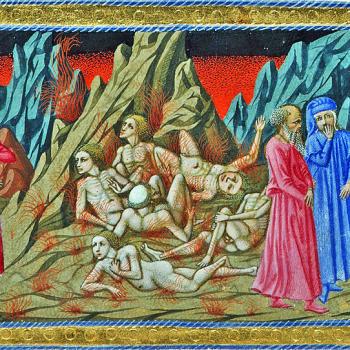Therefore, my beloved, shun the worship of idols (1Cor. 10:14 RSV).

Idolatry is spiritually dangerous because it distorts the relationship between God and creation. Indeed, it is insidious, as it often takes something which is good and true, something which is honorable and worthy of respect but encourages us to focus our spiritual attention on it instead of God. Through idolatry, we transform some created good and absolutize it, putting it in the place of God instead of honoring and respecting it according to its relative value.[1]
The response to idolatry should not be nihilistic, following the ideology behind iconoclasm which destroys images because some might have abused them and turned them into idols. Rather, the response to idolatry, especially after the incarnation, is to find how the truth has been distorted and reestablish what has been misappropriated to its proper status. We must reestablish the proper relationship between God and creation, so that God remains understood as superior to, and the cause of, whatever created good which has been honored. The proper response to idolatry is, therefore, twofold: reawakening a sense of how God is every greater than whatever has been idolized, but also to find the goodness and truth which had been distorted by the idolatry and realize that truth in its proper measure instead of totally dismissing and rejecting it because of how it had been abused. Just as we recognize, even in the action of sin, there can be much good which is willed and we do not reject that good in and of itself, so we must not reject the good when it is found mixed with idolatry.
In this respect, if someone were to make an idol to worship the Earth as Mother Earth, thinking Mother Earth is the absolute, the response should not be to reject the notion of Mother Earth, nor to neglect showing respect to Mother Earth.[2] The response is to relative the Earth, to recognize Mother Earth, like our mother, is a created being. The same reason why we do not consider people idolaters if they honor their parents should allow us to understand that honoring Mother Earth, in and of itself, is not idolatry. We can recognize the greatness of Mother Earth and praise her, but in that praise, there should be an acknowledgment that such greatness was given to her by God and it is for this reason why she is great. To properly honor Mother Earth requires us to honor God, but likewise, to honor God is to honor and respect his works and to honor them according to the measure of glory he has given to them. When we do so, we can begin to recognize how Mother Earth helps show us something about God: God in many ways can be said to be like a Mother, as Sergius Bulgakov explained:
The divine energies that operate in the world belong to the eternity of the Absolute, and that which belongs to the world itself in its process exists only in the relative: the world rests in the bosom of God like a child in the mother’s womb. It lives its own life, its own particular processes run in it which belong to it and not the mother, but at the same time it exists in the mother and only by the mother.[3]
God generates creation by giving space for creation, a space which is like a womb; what is within is to be respected because it is from God, filled with grace, and is established for a purpose. All things are made by God in this fashion. But as St. John of Damascus pointed out, God both creates the universe, giving it the matter which it needs, but also makes what exists through the universe itself. Most things emerge from “pre-existing” matter, and because God made the matter, and the processes by which the universe establishes all that is within it, God is also their creator:
Our God, who is glorified in trinity and unity, Himself ‘made heaven and earth, and all things that are in them.’ He brought all things from nothing into being; some, such as heaven, earth, air, fire, and water, from no pre-existing matter; and others, such as animals, plants and seeds, He made from those things which had their existence directly from Him.[4]
Not all things are directly made by God, but rather God allows creation to share in the act of its own generation. This is how and why Mother Earth is capable of inspiring us, representing the way God has allowed the Earth itself to produce life, to give birth to a variety of species, each connected with each other in and through evolutionary processes. Without God’s grace, without his preservation of creation, what he created could vanish. It is God’s grace which preserves creation and all that is within it, just as it is his grace which allows his creation to become more than what it was at its origin, to grow and develop, and generate a variety of living species. Each species, each form of life, indeed, each thing which is established in creation can be said to come to be through God, even if their generation is only indirectly established by him. Each thing which comes to participate in his existence are loved by God. This is what so many have forgotten. Each form of life, each life, is precious, and has its own potential, as well as its own ability to be raised up and participate in the divine life. Thus, the goal of history transcends history, and includes everything finding itself participating with God in the eschaton:
The goal of history leads beyond history to the “life of the future age,” whereas the goal of the world leads beyond the world, to “a new earth and a new heaven.” Only in the kingdom of glory, when time ceases, will the goal of the universe come true, while the whole present day is only the pangs of birth. Humankind and every creature will rise in Christ and in him will realize their nature. Only thin will the creation of the world be ended, completed by God’s omnipotence on the foundation of creaturely freedom. [5]
This truth is often forgotten. So many, while properly believing that God has a special relationship with humanity (thanks to the incarnation), end up believing God only has a special relationship and interest in humanity. The rest of creation, living or not, is said to be established solely for the sake of humanity and the human will. This establishes a poor understanding, not only of God, but of humanity, and it can easily lead into idolatry because through it humanity becomes central and even God is turned into a secondary, instrumental concern, used for the sake of human advancement. Humanity is seen is the goal of creation, not union with God. And once humanity is established, God is forgotten except as some ad extra who helps humanity remain human and the proper and final good for eternity.
For this reason, Andrew Linzey and Dan Cohn-Sherbok are right in saying theological reflections must include a proper reflection of animals in order to avoid idolatry:
In the first place, Jewish and Christian theology need animals to save themselves from idolatry. By ‘idolatry”, we mean the attempt to deify the human species by regarding the interests of human beings as the sole, main, or even exclusive concern of God the Creator.[6]
It is not just animals. It is plants. It is matter itself. All of these goods need to be properly understood as a good in and of themselves and their own particular relationship with God. Creation is a good, and all that is within creation is good. God saw it was good, after all. To dishonor creation, or to think only humanity is good, is to create an absurd notion of God. “A doctrine of God that Creator is thereby propounded who is absurd enough to create a world of millions, perhaps billions, of species and yet be only interested in one of them.” [7] From such absurdity, humanity quickly becomes worshiped, and turned into the true and proper end of all things, even for God himself. God created the world for the sake of humanity: it is as if he needed humanity to properly be himself. That is the logical outcome of so many poor theological reflections on humanity. It is how and why Feuerbach was able to suggest humanity has made God in its own image: for it promotes itself through God and then tries to understand God solely through itself. Is that not the foundation of idolatry, as St. Justin Martyr understood it?
Furthermore, if one studies the question of idols, and investigates why the first makers of your gods gave them human forms, he will discover that this, too, owed its origin to the sacred writings. Since Moses, speaking in the name of God, says in his history: ‘Let us make men in our image and likeness,’ they [erroneously] imagined that men were similar to God in form. Consequently, they began thus to shape their gods, believing that they could make a likeness from another one. [8]
By making humanity the center, everything is relativized, including God, in relation to the absolute which humanity becomes. Theology, by ignoring the vast diversity of life in creation, and the good each form of life has in and of itself, has helped reinforce this idolatrous spirit. God is secretly turned into a human figure rather than humanity (and all others in creation) as being seen as reflections of the divine reality from which they came. Remembering, then, the glory of the rest of creation, honoring it in its relationship to God, including honoring Mother Earth herself, far from being idolatry, actually helps us go beyond it. Christians do not need to fear honoring the good within creation; rather, they should see it as a way to properly honor and thank God for the glory which he has shared with his creation. It helps make sure we do not end up overly honoring ourselves, with humanity looking out to the whole of creation, saying, “Thank you God for making sure we are not like any of the other lowly things of existence around us.” From what Jesus has told us, we know such an attitude leads us far away from God (cf. Lk. 18:9-14).
[1] A Scriptural example of this can be found in the way the bronze serpent made by Moses. It was good, but that good was seemingly misunderstood, as it was turned into “Nehushtan,” and idolized by some by the time of Hezekiah:
In the third year of Hoshea son of Elah, king of Israel, Hezekiah the son of Ahaz, king of Judah, began to reign. He was twenty-five years old when he began to reign, and he reigned twenty-nine years in Jerusalem. His mother’s name was Abi the daughter of Zechariah. And he did what was right in the eyes of the LORD, according to all that David his father had done. He removed the high places, and broke the pillars, and cut down the Asherah. And he broke in pieces the bronze serpent that Moses had made, for until those days the people of Israel had burned incense to it; it was called Nehushtan (2Ki. 18: 1-4 RSV).
[2] While modernity, with its scientism and ultra-rationalism, has caused many to abandon the notion of Mother Earth, we must not forget that Mother Earth (in many different forms, including as Nature) was accepted by many great Christian thinkers throughout the centuries. St. Francis of Assisi did not praise Mother Earth alone: he represented what many others were thinking and doing (including significant theologians) in his era. This is why even his detractors did not use it as a reason to reject him and the Franciscans which he established.
[3] Sergius Bulgakov, Unfading Light. Trans. Thomas Allan Smith (Grand Rapids, MI: William B Eerdmans Publishing Company, 2012), 183.
[4] St. John of Damascus, “On the Orthodox Faith” in Saint John of Damascus: Writings. trans. Frederic H. Chase, Jr. (New York: Fathers of the Church, Inc., 1958), 210.
[5] Sergius Bulgakov, Unfading Light, 183.
[6] Andrew Linzey and Dan Cohn-Sherbok, After Noah: Animals and the Liberation of Theology (Herndon, VA: Mowbray, 1997), 118.
[7] Andrew Linzey and Dan Cohn-Sherbok, After Noah, 118-19.
[8] St. Justin Martyr, “Exhortation to the Greeks” in Writing of Saint Justin Martyr. Trans. Thomas B. Falls (New York: Christian Heritage, Inc., 1948), 416.
Stay in touch! Like A Little Bit of Nothing on Facebook.
If you liked what you read, please consider sharing it with your friends and family!















